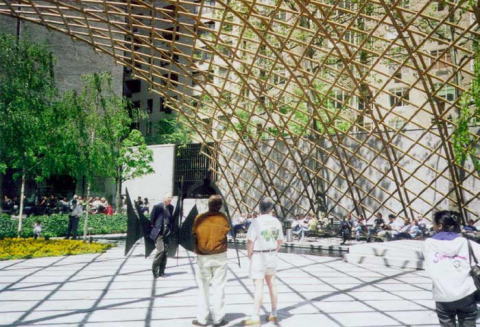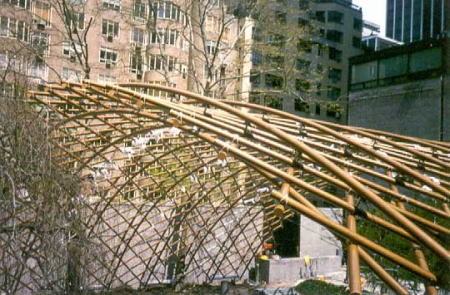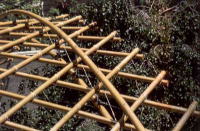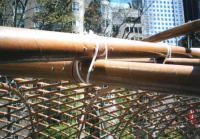WORKS - Paper Tube Structures ニューヨーク近代美術館の紙のアーチ |
 |
 |
  |
||
As part of the Making Choices exhibition at the MoMA, the Paper Arch project revises the notion of the traditional architecture exhibit (for instance, the construction of experimental houses in the garden that took place between 1940 and 1960). During that period, Buckminster Fuller’s Dymaxion Developing Units(1941), Marcel Breuer’s House with a Museum Garden (1945-1955), and Junzo Yoshimura’s Japanese House with a Museum Garden (1945-1955) were placed on exhibit. Although this part of the exhibition was called a “revival,” instead of recreating previous works MoMA asked us to create a modern piece of experimental architecture. In keeping with the spirit of the exhibit, I wanted to do an experimental work like Flau or Breuer, but instead of an individual object like a house I wanted to incorporate the entire Sculpture Garden. I presented an 26.5m-long paper-arch that covers the garden. Because of financial limitations, the paper-arch was realized at a third of its originally planned size, but even so, the concept was sufficiently expressed. By solving the problems faced in using a wood and cardboard tube hybrid structure at the Hanover Expo we were able to construct a pure Paper Architecture here. Although wooden arches were incorporated to withhold the deformation of the cardboard tube grid shell in Hanover, for this occasion cardboard tube trusses were used. During the exhibit of the Arch, various shadow patterns will play out on the garden, patterns that wrap around the trees and flowers and the sculptures by Alexander Calder that I so admire. Furthermore, this arch will become a part of the history of the museum’s architecture and a part of the college made of various architects’ work at the museum. The arch also interestingly contrasts with the hard city texture of the lateral tendency of the museum’s environment.
現代の実験建築をつくろうという企画展への出展作品。MoMAの彫刻庭園にかけられた紙管によるアーチは、ハノーバー万博日本館での課題を解決し、純粋な紙の建築となった。ハノーバーでは紙管のグリッドシェルの変形を押さえるために木のアーチを導入したが、ここでは紙管のアーチを配している。
|